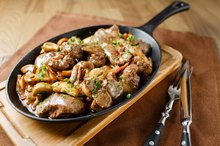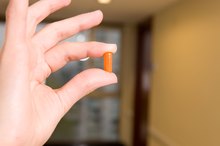What does fact checked mean?
At Healthfully, we strive to deliver objective content that is accurate and up-to-date. Our team periodically reviews articles in order to ensure content quality. The sources cited below consist of evidence from peer-reviewed journals, prominent medical organizations, academic associations, and government data.
- MayoClinic.com; Percent Daily Value: What Does It Mean?; Katherine Zeratsky, R.D., L.D.; May 2010
- National Institutes of Health Drug-Nutrient Interaction Task Force: Important Information to Know When You Are Taking Coumadin and Vitamin K
The information contained on this site is for informational purposes only, and should not be used as a substitute for the advice of a professional health care provider. Please check with the appropriate physician regarding health questions and concerns. Although we strive to deliver accurate and up-to-date information, no guarantee to that effect is made.
Chickpeas & Vitamin K
Chickpeas, also known as garbanzo beans, have a nutty flavor and provide more than 7 g of protein per 1/2 cup, making them an appealing alternative to animal-derived proteins. Commonly added to salads or soups, served roasted or as falafel or hummus, chickpeas are full of important nutrients, including fiber, folate and iron. Although chickpeas provide vitamin K, the contribution to your overall intake is likely minimal, particularly if you consume a balanced diet.
Content
Chickpeas provide 3.3 mcg of vitamin K per half-cup serving. The Institute of Medicine estimates that 90 mcg of vitamin K per day for women and 120 mcg daily for men is enough to meet dietary needs for the nutrient. The daily value of vitamin K, which is established by the U.S. Food and Drug Administration, is 80 mcg. Foods with less than 5 percent of the daily value of a nutrient are considered low sources of that nutrient 2. Foods such as cooked chickpeas that contain less than 4 mcg of vitamin K per serving are considered low sources.
- Chickpeas provide 3.3 mcg of vitamin K per half-cup serving.
- Foods such as cooked chickpeas that contain less than 4 mcg of vitamin K per serving are considered low sources.
Vitamin K Facts
Soybean Oil Nutrition Facts
Learn More
Vitamin K, sometimes referred to as the clotting vitamin, helps make four proteins that are necessary to the development of blood clots. There are also potential links between adequate vitamin K levels and healthy bone development, according to the Harvard School of Public Health. Your body also makes its own vitamin K using intestinal bacteria. Most people consume enough vitamin K, which is abundant in foods such as leafy green vegetables, broccoli and cauliflower. Although chickpeas are not a major source of dietary vitamin K, such foods contribute to a healthy intake of a variety of nutrients.
- Vitamin K, sometimes referred to as the clotting vitamin, helps make four proteins that are necessary to the development of blood clots.
Exceptions
Raw chickpeas provide almost three times as much vitamin K as cooked chickpeas, packing 9 mcg of vitamin K per half-cup portion. Additionally, sprouted chickpeas generally contain higher concentrations of vitamin K than boiled or roasted varieties. Because nutritional content among chickpea products may vary, check food labels for the exact vitamin K content when you purchase canned or dried chickpeas, hummus or falafel, particularly if you need to monitor your intake for health reasons.
Considerations
B12 Deficiency & Low White Blood Cell Count
Learn More
Individuals taking blood thinning medications such as warfarin or Coumadin generally need to maintain a consistent intake of vitamin K, according to the National Institutes of Health. In this case, work with your doctor to design a meal plan that provides appropriate amounts of vitamin K. Otherwise, eating chickpeas along with a variety of other lean proteins, vegetables, fruits and whole grains should meet your dietary need for vitamin K.
Related Articles
References
- U.S. Department of Agriculture: Nutrient Data Laboratory
- MayoClinic.com; Percent Daily Value: What Does It Mean?; Katherine Zeratsky, R.D., L.D.; May 2010
- Purdue University Center for New Crops and Plant Products: Cicer Arietinum L. (Chickpea)
- Chickpeas, canned, drained, rinsed. FoodData Central. U.S. Department of Agriculture. Published April 1, 2019.
- Jukanti AK, Gaur PM, Gowda CL, Chibbar RN. Nutritional quality and health benefits of chickpea (Cicer arietinum L.): A review. Br J Nutr. 2012;108 Suppl 1:S11-26. doi:10.1017/s0007114512000797
- Reynolds A, Mann J, Cummings J, et al. Carbohydrate quality and human health: A series of systematic reviews and meta-analyses. Lancet. 2019;393(10170):434-445. doi:10.1016/S0140-6736(18)31809-9
- Wallace TC, Murray R, Zelman KM. The nutritional value and health benefits of chickpeas and hummus. Nutrients. 2016;8(12). doi:10.3390/nu8120766
- Podolak I, Galanty A, Sobolewska D. Saponins as cytotoxic agents: a review. Phytochem Rev. 2010;9(3):425-474. doi:10.1007/s11101-010-9183-z
- Takata Y, Cai Q, Beeghly-Fadiel A, et al. Dietary B vitamin and methionine intakes and lung cancer risk among female never smokers in China. Cancer Causes Control. 2012;23(12):1965-75. doi:10.1007/s10552-012-0074-z
- Yang D, Baumgartner RN, Slattery ML, et al. Dietary intake of folate, B-vitamins and methionine and breast cancer risk among Hispanic and non-Hispanic white women. PLoS ONE. 2013;8(2):e54495. doi:10.1371/journal.pone.0054495
- Becerra-Tomas N, Diaz-Lopez A, Rosique-Esteban N, et al. Legume consumption is inversely associated with type 2 diabetes incidence in adults: A prospective assessment from the PREDIMED study. Clin Nutr. 2018;37(3):906-913. doi:10.1016/j.clnu.2017.03.015
- Zafar TA, Kabir Y. Chickpeas suppress postprandial blood glucose concentration, and appetite and reduce energy intake at the next meal. J Food Sci Technol. 2017;54(4):987-994. doi:10.1007/s13197-016-2422-6
- Kim SJ, de Souza RJ, Choo VL, et al. Effects of dietary pulse consumption on body weight: A systematic review and meta-analysis of randomized controlled trials. Am J Clin Nutr. 2016;103(5):1213-23. doi:10.3945/ajcn.115.124677
- Bar-El Dadon S, Pascual CY, Reifen R. Food allergy and cross-reactivity-chickpea as a test case. Food Chem. 2014;165:483-8. doi:10.1016/j.foodchem.2014.05.138
Writer Bio
Pam Murphy is a writer specializing in fitness, childcare and business-related topics. She is a member of the National Association for Family Child Care and contributes to various websites. Murphy is a licensed childcare professional and holds a Bachelor of Arts in English from the University of West Georgia.









